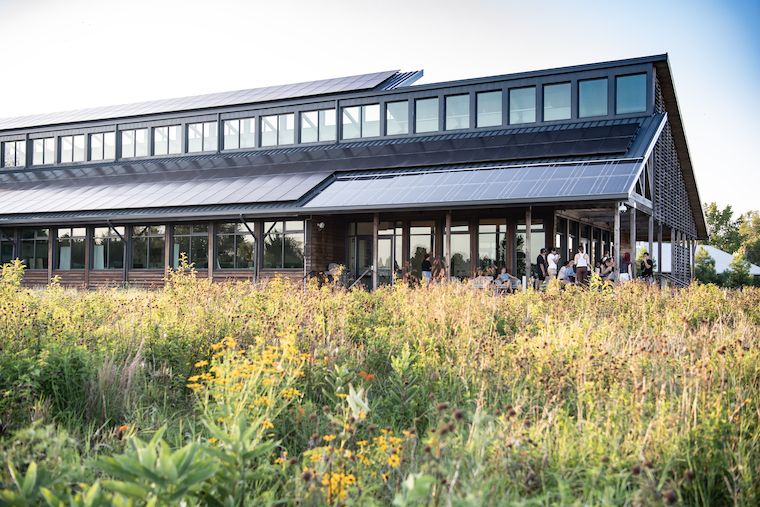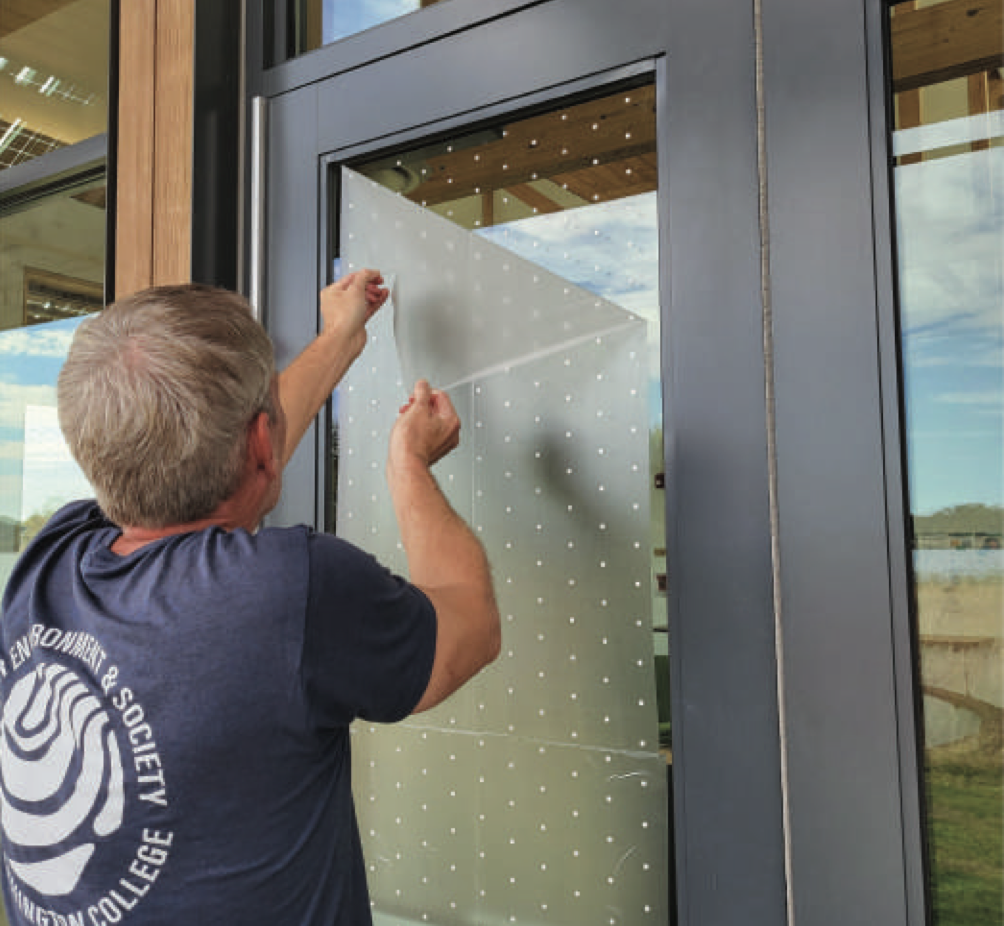Work at Semans-Griswold Environmental Hall Earns Recognition
The Washington College Center for Environment & Society was honored for its building standards and attention to bird conservation.

The Washington College Center for Environment & Society (CES) is leading the way in demonstrating how to live, work, and play in harmony with our natural environment on the Chesapeake Bay, using its innovative facilities and educational programs to promote sustainability and conservation. Recently, CES was recognized for these efforts with a Living Building Certification from the International Living Future Institute, the world's most progressive high-performance building certification authority. It was also lauded for its work in avian-safe building by Feather Friendly®.
A Living Building
Semans-Griswold Environmental Hall (SGEH), which provides academic and lab spaces for the College's growing environmental science and biology programs and houses the offices for CES, illustrates Washington College's commitment to lead liberal arts institutions that study and care about our environment. Built on a previous industrial complex that has been fully remediated to no longer pollute the river, this 11,500-square-foot building serves as a regional hub for hands-on research on the Chesapeake and is a magnet for thought leadership centered on the environment and the challenges facing the region, the country, and the world. SGEH now serves as a model for sustainable buildings after completing the International Living Future Institute's Living Building Challenge, the world's most rigorous standard for green buildings.
The Challenge recognizes regenerative designs that connect occupants to light, air, food, nature, and community. Living buildings are designed to be self-sufficient and remain within their building site's resources. For example, the buildings should produce more energy than they consume and provide healthy and beautiful environments for human activities. SGEH exemplifies the four petals of the Living Building Challenge – Energy, Beauty, Health + Happiness, and Equity.
"The College's decision to rehabilitate natural lands and design a building that relies solely on renewable energy sources speaks volumes about our commitment to environmental conservation," said Valerie Imbruce, CES' Lammot Du Pont Copeland Director. “Washington College's Semans-Griswold Environmental Hall exemplifies this commitment. This stunning building serves not only as a regional hub for environmental research, but also as a model for sustainable construction.”
Additionally, SGEH has implemented features that go beyond the certification, which include planting low-impact, natural landscaping that includes habitat for pollinators and birds and building at a higher elevation than required, in anticipation of sea level rise and associated storm surges. These features highlight Washington College's commitment to renewable energy, human health, equitable community development, education, and outreach. Read more about the features of SGEH which led to its Living Building Certification on the International Living Future Institute website.
A Friend to Those in Flight
Nestled amidst native meadows, shrubbery, and marshlands on the Chester River, SGEH not only provides a conducive learning environment for Washington's undergraduates, but it also nurtures a thriving ecosystem, offering vital sustenance and refuge to diverse bird species and pollinators in the area. Among the local avian inhabitants are song sparrows, northern mockingbirds, Carolina wrens, and majestic bald eagles. Recognizing the dangers posed by glass collisions, Washington College has installed Feather Friendly® window markers to deter birds from striking the building at SGEH's waterfront facilities.
 An estimated 1 billion birds succumb to such collisions across North America every year.
In alignment with Washington College and CES' commitment to habitat and bird conservation,
Feather Friendly® Bird Collision Deterrent Markers were first installed on porch windows
at SGEH in 2023. The installation was such a success that Feather Friendly® drafted a case study on the installation to help encourage similar sites to partake in the initiative.
Additional installations on the SGEH office and lab windows throughout the rest of
the building are underway, with plans to treat glass areas on Washington College's
main campus in the works as well.
An estimated 1 billion birds succumb to such collisions across North America every year.
In alignment with Washington College and CES' commitment to habitat and bird conservation,
Feather Friendly® Bird Collision Deterrent Markers were first installed on porch windows
at SGEH in 2023. The installation was such a success that Feather Friendly® drafted a case study on the installation to help encourage similar sites to partake in the initiative.
Additional installations on the SGEH office and lab windows throughout the rest of
the building are underway, with plans to treat glass areas on Washington College's
main campus in the works as well.
Through CES, the College continues to keep the health and preservation of regional and migratory birds a top priority in its work and research. Foreman's Branch Bird Observatory, a major bird banding station housed at the College's River and Field Campus, has a rich 26-year history and has caught, identified, banded, and released over 350,000 birds representing more than 125 species including herons, owls, ospreys, hawks, orioles, woodpeckers, hummingbirds, blackbirds, wrens, mockingbirds, bluebirds, and robins. The observatory also currently serves as a testing site for various bird-friendly glass in collaboration with the American Bird Conservancy.
An Active Commitment to Sustainability
Washington College is deeply tied to and committed to sustainability. The campus's location on the low-lying Eastern Shore of the Chesapeake Bay is among one of the most vulnerable areas to climate change and provides a unique setting to study the effects. The College views its impacts on the natural world through the lens of environmental sustainability and continues to invest in sustainable energies and encourage areas across the institution to generate innovative ideas and practices with the goal of not merely meeting metrics, but that we develop a culture of sustainable practices.
“The Washington College Center for Environment and Society is a shining example of how educational institutions can lead the way in sustainability and conservation,” said College President Mike Sosulski.“Through its innovative facilities, educational programs, and dedication to protecting the Chesapeake Bay, CES is making a lasting impact on our environment. Its initiatives bolster Washington College's sustainability pledge, reinforcing our commitment to the health of our planet and people.”
A full account of CES' sustainability efforts and research is available on the Center's webpage. Learn more about Washington College's overall efforts to build and grow a sustainable environment - from the campus garden to watershed stewardship to serving as a certified bee and bird campus – on its Sustainability webpage.
- Dominique Ellis Falcon